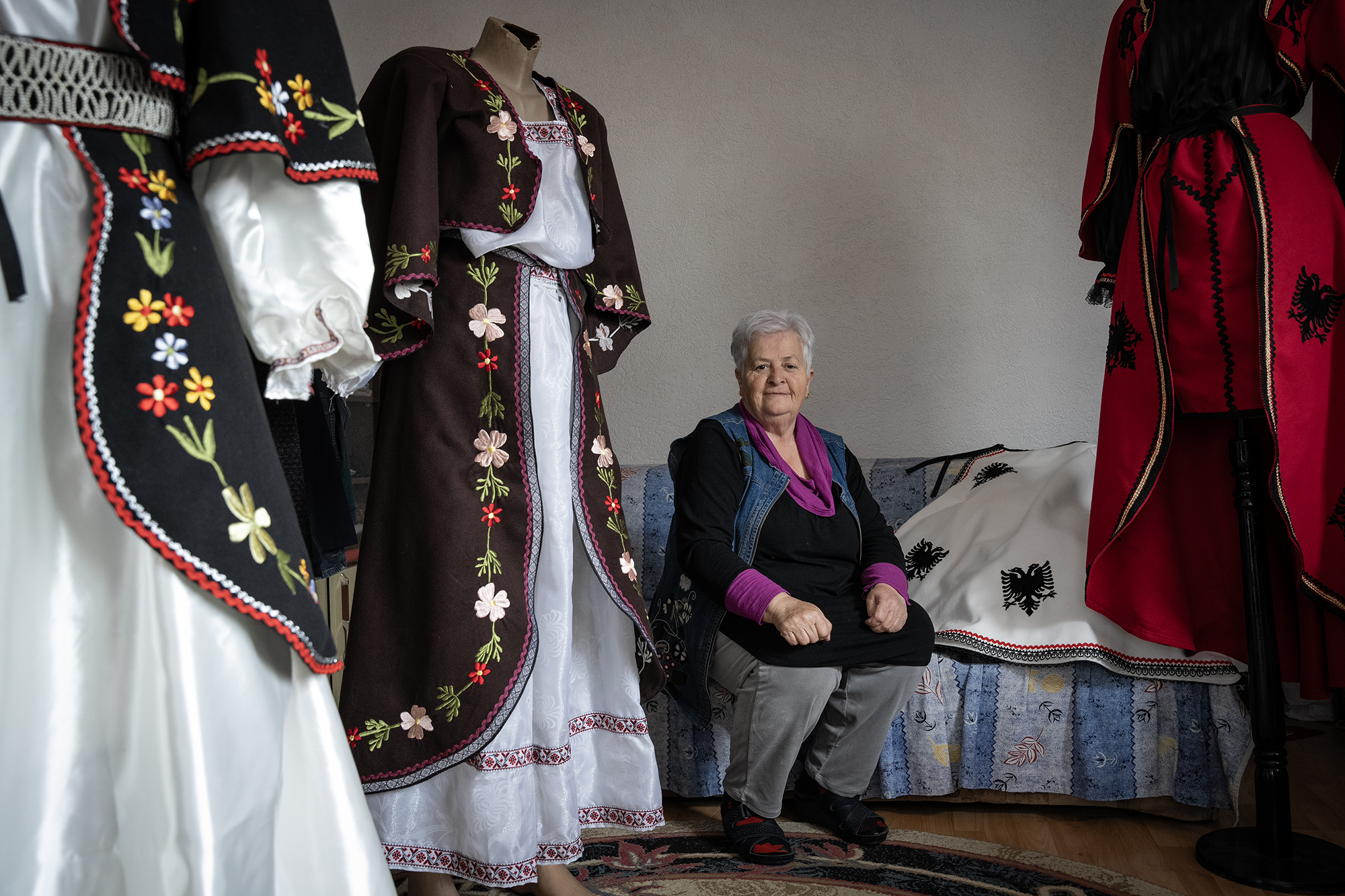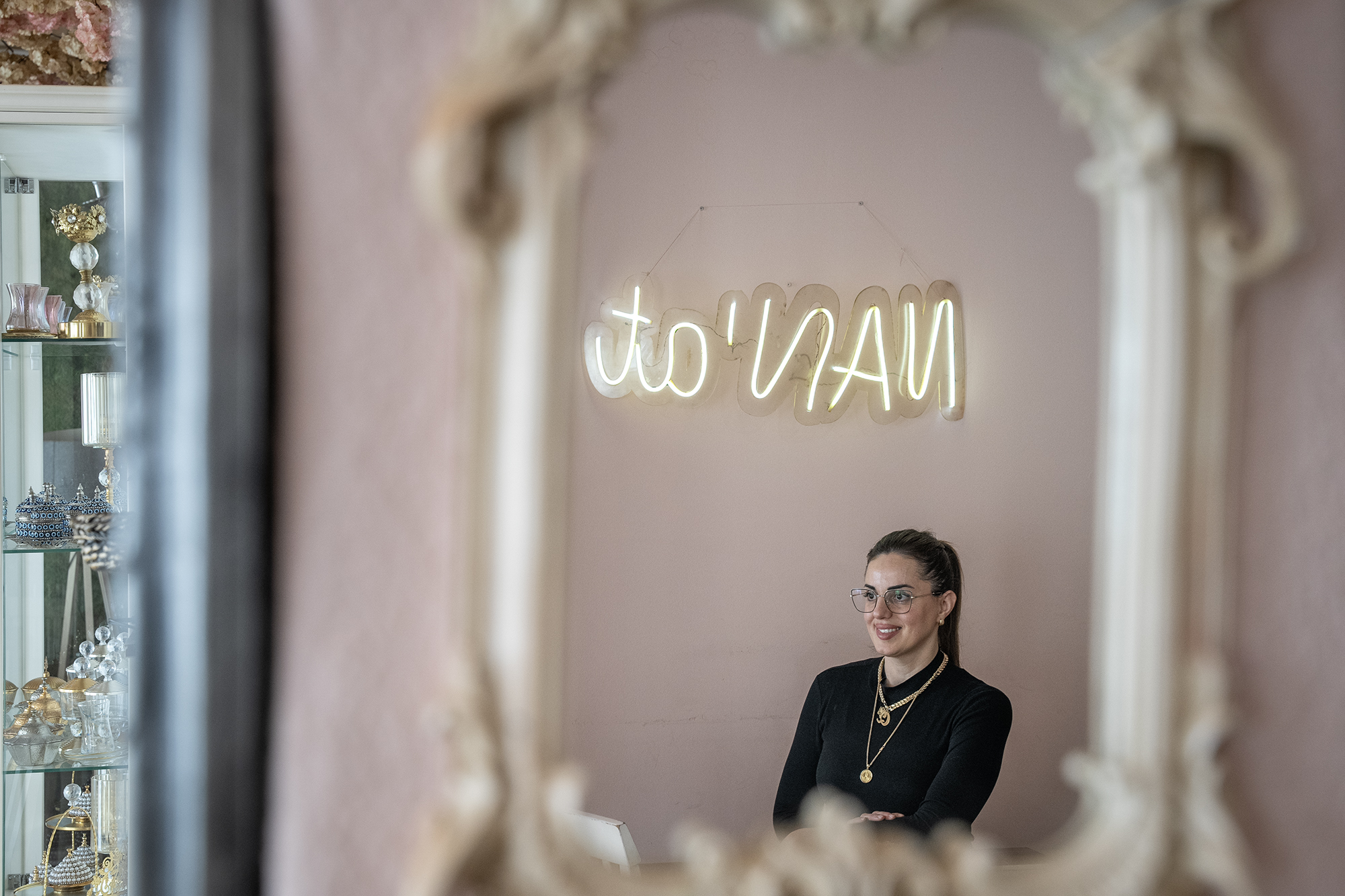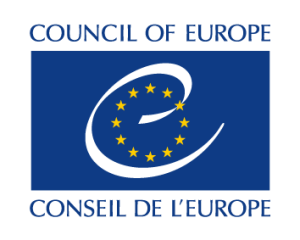Bedrije Shurdhani, a 63-year-old from Gjilan, starts every day with the light sound of moving threads and scissors opening and closing as they cut the decorations she uses to sew different embroidery and clothing.
Sewing, from a childhood passion, turned into a profession on which she has survived since the end of the 1998-1999 war in Kosovo. During that time, Shurdhani’s husband died. As a single mother with a house destroyed in the war, it fell on her to get her and her five-year-old son’s life back on its feet.
“It was a challenge. Our house was destroyed because they put a bomb there during the war. All the doors and windows were broken. But even to work was a challenge because you had to find yourself, then the clients. Where to find them?” Shurdhani asked, recalling the uncertainties of entering an unknown job market.
Her talent became a form of survival and a long-term solution given that her only support was occasional help from family members and modest state social assistance. Since full-time employment would force her to leave her son alone, she started working from home.
Given the difficulties she initially faced, she stayed with her family. She didn’t have much help from others, especially from the government, even though she sought it. She describes the grant application as a long, difficult and tiring procedure.
“I applied for grants twice. I won one, the other I didn’t. It took me two or more weeks to gather and submit documents and they still rejected me. I gave up, now even when I see the grant calls, I don’t apply,” she said. “I was required to gather many documents to apply for one organization. They even asked for a letter of confirmation from the Basic Court that my business is not under investigation, that I am not under investigation.”

For more than 20 years Bedrije Shurdhani has lived on her job as a tailor. Photo: Majlinda Hoxha / K2.0
While Shurdhani hesitates to apply for grants after the unpleasant experience, Lume, a woman in her fifties from Gjilan who did not want to be identified by her real name, has not applied at all because she was demotivated from the outset. She has worked from home as a seamstress for over 20 years and has recently started preparing and selling traditional foods.
She asked someone about the grant procedures because she needed a new sewing machine, but ultimately, she was intimidated by the process and didn’t follow through, even though she needed the support. “A lot of people told me that it requires a lot of effort, you have to fill out a mountain of documents, and to wait a lot, so this is how you’re left behind. So I gave up, it demoralized me,” she said.
Although the government and various nongovernmental organizations promote calls to support women’s businesses, it seems that these calls are not reaching all women.
In February 2024, the GAP Institute published a research report on the challenges and opportunities of market access for businesses owned by women and minority communities in Kosovo.
The report, includes findings from focus groups with 35 business representatives and interviews with stakeholders. Those included in the report, besides mentioning the insufficiency of grants from the local and central government, emphasize that the excessive documentation required at the central level makes applying for grants or subsidies significantly more difficult.
Also, in some cases, applicants are required to submit applications in physical copies, mainly to the headquarters of the institutions in Prishtina. This request is seen as an additional expense and difficulty that disproportionately affects applicants who do not live in Prishtina.
According to this report, cultural and gender biases, limited financial resources, burdensome bureaucratic processes and mistrust in the selection criteria for receiving grants are also major challenges for businesses led by women or minority communities.
These may be aspects that contribute to female unemployment, which continues to remain high when compared to that of men. In the first quarter of 2023, according to the Kosovo Agency of Statistics, the unemployment rate among job-seeking women was 18.6% compared to 8.6% among men. Overall, of the 132,702 women of working age in Kosovo, only 22.8% participate in the labor force.
In addition to the difficulties in accessing grants, women in Kosovo face a series of other obstacles stemming from structural deficiencies in addressing the gender gap in employment, the lack of gender-sensitive policies and rigid gender roles that continue to burden women.
Not only one job
The hope of finding a job had made Lume learn how to use a sewing machine. As a young woman, she completed a tailoring course. After that, she spent her days and nights working with a sewing machine to perfect her craft.
“I stayed up all night learning how to use it and to make my own money. I used to stay all night long to figure it out, I had so much will to work,” she said.
Initially, she could not find a job. Then the birth of children and her need to look after them became a decisive factor. She stopped looking for work and started finding clients who she could serve as a seamstress on her own.
“It is very difficult because the payment [from sewing cushion covers] was low and my children were still little. I had to do the housework, prepare the meals, take care of the children, and sew the cushion covers on top of that,” she said. “I didn’t have anyone to look after my children.”

As well as the work they are paid for, women do a lot of work that is neither acknowledged nor paid. Photo: Majlinda Hoxha / K2.0
Meanwhile, in Gjilan, in the late hours of the night when darkness covers the city, the light is still on in 50-year-old Merita’s kitchen. Merita did not want to be identified by her real name. Her work preparing cakes to sell begins after a day full of housework. She has done this job from home for three years now.
The ingredients and work tools are scattered in a disorganized way; there is hardly a free place on the table. This process becomes even more difficult due to the lack of a suitable refrigerator or a large place where Merita can leave all the equipment. Thus, she is forced to walk around to use all the work tools, which are located in different corners of the house.
For her, an ordinary day often ends at dawn.
“When you have a workshop, it is easier because you go to that workplace, you know that you are at work, you have your equipment close, and you only deal with that work. But this way [working at home] you have to respond to the house, the guest, the work and anything else,” said Merita.
Care work is a burden that prevents women from equal access and participation in the labor market. In 2022, the Institute for Social Policy Musine Kokalari published nationwide research about the extent and social perceptions of unpaid care work in Kosovo. The study found that women in Kosovo, on average, spend 6.2 hours a day doing unpaid care work, while men spend 3.5 hours doing similar work. According to the study, women spend 44% more time performing these works than men.
According to Luljeta Demolli, executive director of the Kosovar Gender Studies Center, women are left alone to face the responsibility of raising their children due to the high financial cost of sending them to daycare.
“The burden of care has become very expensive in Kosovo as well. To send a child to the daycare is very expensive, so all the care has been left in the hands of women. Especially in villages and small towns, it is carried out by women and this makes it difficult and creates new challenges for women,” she said.
Because of rigid gender roles, some policies, or the lack thereof, disproportionately affect women. The lack of public nurseries is one of them. According to reporting, Kosovo has 49 public preschool education institutions and 177 private ones, in which the monthly payments exceed 100 euros per child. Meanwhile, the Kurti government had promised the construction of 160 daycares during its four year mandate. Now, in the fourth year of Kurti’s government, only four daycares have been built in Kosovo.
Thus, in addition to paid work, women often have to engage in housework, which is often not even recognized as work. These additional responsibilities also determine the way that women approach the labor market and often become reasons for women to either withdraw from the formal labor market altogether or, in order to survive and provide income, develop informal work activities.
Facing uncertainty
Merita and Lume are some of the many informally self-employed women in Kosovo, where there is also an immense unemployment of women. Women in Kosovo are two times more likely to be employed in informal work than men, according to an analysis published by the Kosovo Women’s Network (KWN) in February 2024.
Women, twice as likely to be involved in informal work
According to KWN’s analysis, titled "In the Shadows: A Gender Analysis of Informal Work in Kosovo," it is estimated that 42% of Kosovars were involved in informal work in 2022. Women were almost twice as likely as men to be involved in informal work, thus constituting 65% of all informal workers. The report adds that “Women from rural areas and women aged 46-64 were more likely to work informally.”
According to the analysis, the negative consequences of informal work include insecure employment, unstable income, irregular working hours, unpaid overtime, lower wages for some, lower pensions, limited access to assets, health consequences, violation of labor rights and fiscal evasion contributing to a loss of income for the state. In addition, informal work, because it is unregistered, is often not recognized as work experience, especially at retirement age, thus increasing instability for the future.
Even for Merita, informal work is not sustainable and increases uncertainty for the future.
“It seems to me that it is better to have a job that has fixed hours, you go to work and come back, when the end of the month comes you get your salary. But this way, one month maybe you may have more work, but two or three months you may not have any work at all and you don’t know what awaits you,” she said.
Another aspect that is listed as a challenge in the employment of women is age, which, when combined with gender, creates double discrimination.
Arjeta Maka is a coordinator at Gruaja Hyjnore, a nongovernmental organization in Gjilan that has worked to advance women’s rights through training, information sessions, organizing fairs and other activities over the past 13 years.
According to her, women are also denied job positions because of their age. Additionally, various government initiatives for employment focus more on youth. “One of the challenges, I think, is sometimes age, in general, not only in Gjilan. For example, the Superpuna platform at the start is only for youth, which I think should be inclusive because of age,” she said.

Qëndresa Ibraj Berisha, one of the founders of NAN’at, said that others were pessimistic when they opened the restaurant. Photo: Majlinda Hoxha / K2.0.
Recent analysis studied the challenges of access to the labor market for middle-aged women. Findings from the focus groups suggested that ageism — age discrimination — is present, as state employment policies are largely youth-oriented, leaving a gap in support for older women.
Despite all the challenges faced by Shurdhani, Merita and Lumja, which range from the space in which they have to develop their business, their gender or their age, in their city there are several small places of women’s employment that were created by the women themselves.
One of them is the NAN’at restaurant in Gjilan, which was founded in 2019 by Lirie Berisha-Biqkaj and Qendresa Ibraj-Berisha. In addition to having been founded by two women, this business is dedicated to employing only women and serving only female customers, except when family events are organized in this restaurant.
Ibraj-Berisha said that, in the beginning, people, and in some cases even their family members, were pessimistic about the success that a business destined to serve only women can have.
“In the beginning, when we thought of it, we wanted to do something that hadn’t been done before. The idea was welcomed, but not many believed that it would go very well,” she said.
Currently, this restaurant has five women workers. The co-founder of this restaurant, Berisha Biqkaj, said that NAN’at has specifically given opportunities especially to women over 50 years old.
“We have had cases when women who weren’t employed before, the first opportunity to work was given to them here,” said Berisha-Biqkaj.
Feature Image: Majlinda Hoxha / K2.0

This article has been produced with the financial support of the Council of Europe Project ‘Promoting human rights and non-discrimination principles at the local level’ phase II, financed by UNMIK and implemented by the Council of Europe Office in Pristina. Views expressed herein can in no way be taken to reflect the official opinion of either party.
 Want to support our journalism? Become a member of HIVE or consider making a donation. Learn more here.
Want to support our journalism? Become a member of HIVE or consider making a donation. Learn more here.





